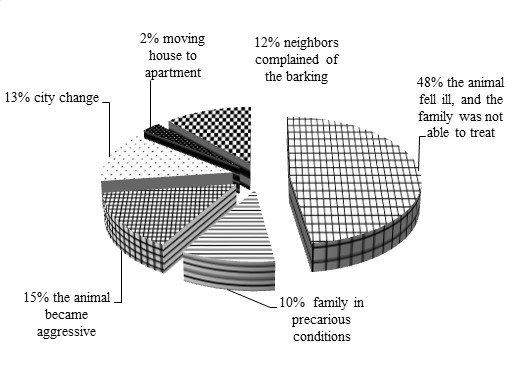Knowledge of students of public schools about Responsible Ownership of pets and Zoonoses
DOI:
https://doi.org/10.21708/avb.2019.13.2.8342Resumo
The objective of this study was to evaluate the knowledge of public school students of Teresina (PI, Brazil) about Responsible Pet Guard and some Zoonoses. The research was conducted through questionnaires, and their analysis revealed that most students have a pet and know what is responsible ownership. However, the most do not know what zoonosis is. Television was the main source of information, therefore it is suggested that this means of communication be used more intensively to disseminate responsible ownership, animal welfare and Zoonoses. Most students reported that the topic Zoonoses was never addressed in school, demonstrating that the subject should be more discussed. Vaccination is the best known practice of Responsible ownership. The deworming is practiced by 51.82% of the interviewees and castration was cited by 30.36%. Most students reported that that pets only have access to the street accompanied, but 32.05% have stated that their pet has access to the street. This conduct can lead to traffic accidents, injuries from fights with other dogs, bites of people, spread of zoonoses and other problems. Nearly half of the students claimed that their family had abandoned a pet, mainly because of financial difficulties to treat diseases presented by the animal. The main Zoonosis recognized by the students was rabies. Approximately 80% do not recognize Visceral Leishmaniasis and toxoplasmosis as Zoonoses. It was concluded that public school students of Teresina have little knowledge about the Responsible ownership and on Zoonoses.
Downloads

Downloads
Publicado
Edição
Seção
Licença
Autores que publicam na Acta Veterinaria Brasilica concordam com os seguintes termos: a) Autores mantém os direitos autorais e concedem à revista o direito de primeira publicação, com o trabalho simultaneamente licenciado sob a Licença Creative Commons Attribution que permite o compartilhamento do trabalho com reconhecimento da autoria e publicação inicial nesta revista. b) Autores têm autorização para assumir contratos adicionais separadamente, para distribuição não-exclusiva da versão do trabalho publicada nesta revista (ex.: publicar em repositório institucional ou como capítulo de livro), com reconhecimento de autoria e publicação inicial nesta revista. c) Autores têm permissão e são estimulados a publicar e distribuir seu trabalho online (ex.: em repositórios institucionais ou na sua página pessoal) a qualquer ponto antes ou durante o processo editorial, já que isso pode gerar alterações produtivas, bem como aumentar o impacto e a citação do trabalho publicado (Veja O Efeito do Acesso Livre).


 Esta obra está licenciada com uma Licença
Esta obra está licenciada com uma Licença 